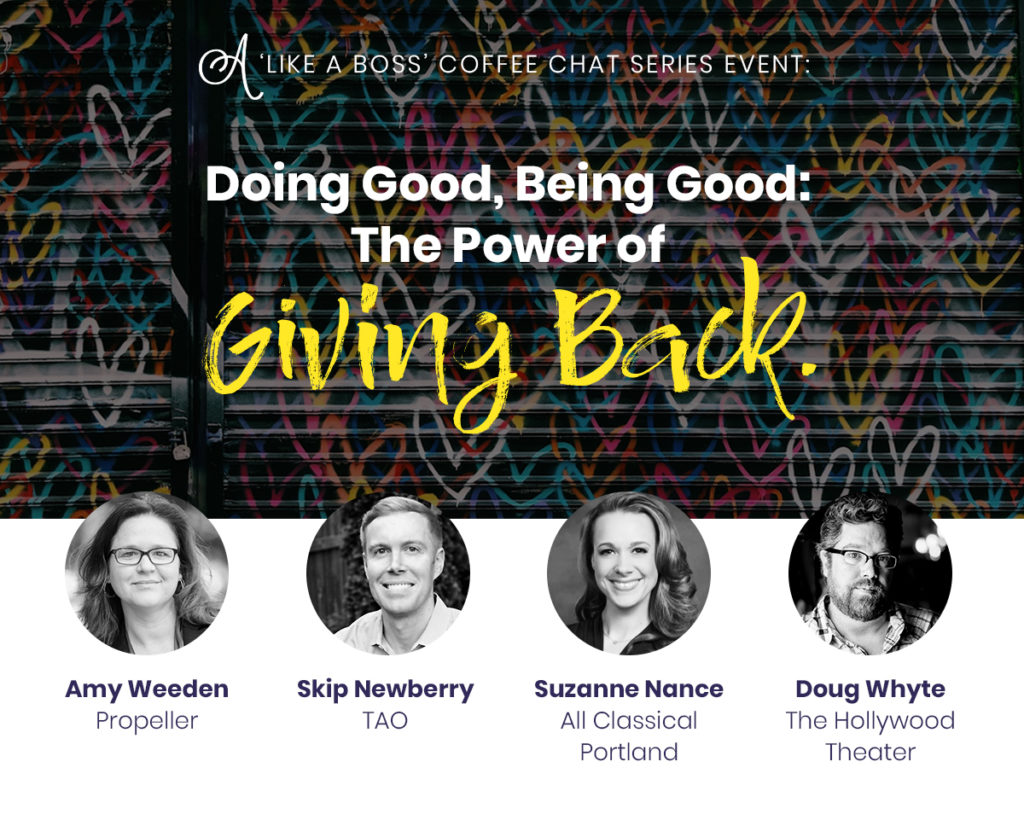January “Like a Boss” Coffee Chat Rewind: The Power of Giving Back

At our most recent “Like a Boss” Coffee Chat we had a great morning talking, learning and sharing about what it means to do good and give back. On our panel were Amy Weeden, co-founder and managing partner at Propeller; Doug Whyte, executive director at the Hollywood Theatre; Suzanne Nance, chief executive officer and on-air host at All Classical Portland; and Skip Newberry, president and chief executive officer at Technology Association of Oregon.
Each of our presenters had a unique viewpoint to share when it came to the impact of giving back, and how to make it effective, meaningful and manageable within the confines of busy work and personal lives.
Here are a few of our favorite takeaways from the morning:
Ann: Doug’s advice to follow the dream not the money really resonated with me. It’s easy to get caught up in how much money needs to exist in order to accomplish something, but his point was that when you put your focus on the ultimate impact, the money will naturally follow.
Hailey: I liked Doug’s point about using your professional skills to give back, and how that can be particularly helpful for a lot of organizations that may not otherwise have access to those resources.
Savanna: For me it kept coming back to the point that giving back requires leaving your comfort zone. I think each panelist had a different example, like when Doug talking about following the idea versus the money or Amy talked about taking on the Board Chair role for Opal Creek, despite not knowing if it would be too much of a time commitment. I think giving back whether from the corporate or non-profit perspective require discomfort as you’re forced to get out of your own bubble and take a chance.
Kelda and Natalie: We both connected with Amy’s advice to try things outside your comfort zone or areas of expertise as a way to grow and evolve.
Addy: It’s clear that a major factor in the success of non-profits comes from the support of the community. However, the level of success of a non-profit doesn’t solely come from the amount of financial support they receive. Giving time, energy, care, respect and attention, along with listening and spreading the word can be significant ways to show support. With the backing of the community, non-profits can achieve major success and reach. Oftentimes, when you give support, you will receive support. However, this should not, and is not, the reason why giving back is so valued. Giving back because you actually want to is the most impactful and valuable quality that people, and businesses, can have.
Kris: I liked hearing Doug’s perspective on pursuing sponsorship/grant/partnership opportunities based on fit and interest rather chasing the money; I can see how pursuing the finances first, and subsequently trying to squeeze a misaligned pursuit into an established organization with certain strengths and processes could ultimately prove self-defeating. Undoubtedly it creates a drain on resources, which ends up costing more (in dollars and emotional strain). It’s another example of how letting passion lead the way (and keeping a bit of faith) will result in more authentic, mutually beneficial outcomes. And feeling good about the overall process means you’re likely to pursue it again.